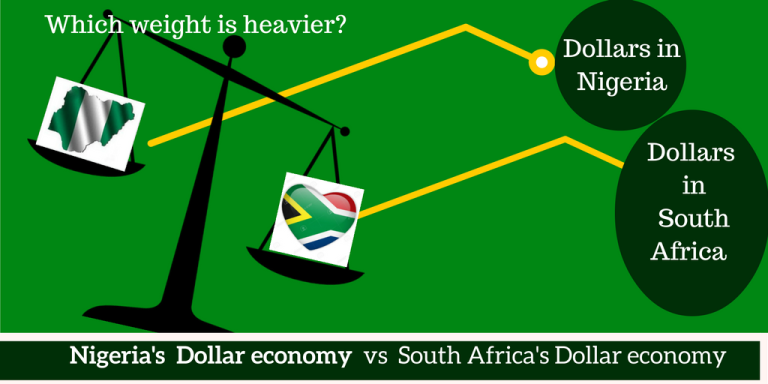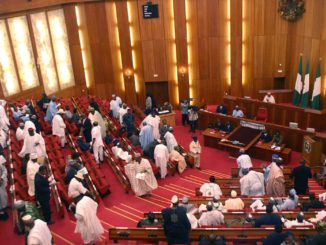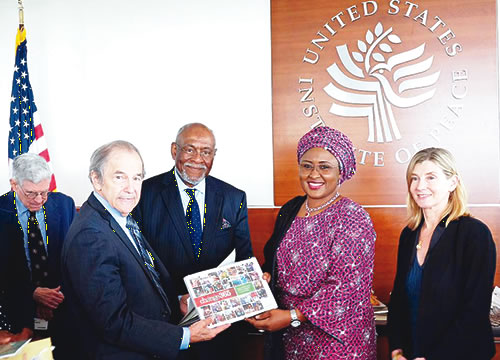
ABUJA—South Africa’s economy has regained the position of Africa’s largest in dollar terms more than two years after losing it to Nigeria as the value of the nations’ currencies moved in opposite directions. Based on gross domestic product at the end of 2015 published by the International Monetary Fund, the size of South Africa’s economy is $301 billion at the rand’s current exchange rate, while Nigeria’s GDP is $296 billion.
That’s after the rand gained more than 16 percent against the dollar since the start of 2016, and Nigeria’s naira lost more than a third of its value after the central bank removed a currency peg in June.
Both nations face the risk of a recession after contracting in the first quarter of the year. The Nigerian economy shrank by 0.4 percent in the three months through March from a year earlier amid low oil prices and output and shortage of foreign currency.
That curbed imports, including fuel. In South Africa, GDP contracted by 0.2 percent from a year earlier as farming and mining output declined.
“More than the growth outlook, in the short term the ranking of these economies is likely to be determined by exchange rate movements,” Alan Cameron, an economist at Exotix Partners LLP, said.
Although Nigeria is unlikely to be unseated as Africa’s largest economy in the long run, “the momentum that took it there in the first place is now long gone.” The South African rand rallied as investors turned to emerging markets with liquid capital markets to seek returns after Britain voted to leave the European Union on June 23, even as the central bank forecast the economy won’t expand this year and the nation risks losing its investment-grade credit rating.
The ruling African National Congress’s lowest support since 1994 in the August 3 local government vote led to further gains on speculation that it will pressure the party to introduce economic reforms that will boost growth and cut unemployment.
In Nigeria, investors did not flock to buy naira-based assets after authorities removed the peg of 197-199 naira per dollar.
The Central Bank of Nigeria raised its benchmark interest rate to a record in July to lure foreign money, even as the IMF forecast the economy will contract 1.8 percent this year. Nigeria was assessed as the continent’s largest economy in April 2014 when authorities overhauled its GDP data for the first time in two decades. The recalculation saw the Nigerian economy in 2013 expand by three-quarters to an estimated N80 trillion.
The rand gained 1 percent to 13.2805 per dollar at 4:03 p.m. in Johannesburg on Wednesday. The naira weakened 2.7 percent to N320 per dollar.
END




The economy is in tatters and could get even worse, it is clear this govt has got it upside down with the economy. When people were saying this govt should hit the ground running they took it as some kind of thing that people just say. Instead they spent six months choosing ministers at such a critical time. I mean what exactly is their thinking process they put in place restrictions that prevented international investors from repatriating their earnings then go to those same international investors home countries to solicit for new FDI into Nigeria, unless something drastic happens they are not coming back for a very very very long time. The FG is disjointed economically working at cross purposes with the wrong team. Right now they cannot even sack the CBN governor or the finance minister that will make things even worse, they should hire the real globally respected experts if they can get them to leave their private businesses or jobs, give them innocuous positions such as special adviser to the president on…. , and let that person be the defacto head of the min of finance till 2018 or 19 when things have stabilised or when the next election comes round they can then have a cabinet reshuffle. Also it needs to be drummed into the presidents ear that what we learned over a decade ago , the CBN is meant to make its decisions independently from the FG. All comments on monetary policy, interests rates and Forex rates are to be left strictly to the CBN Governor ALONE!!! Stop sending mixed signals to the financial markets